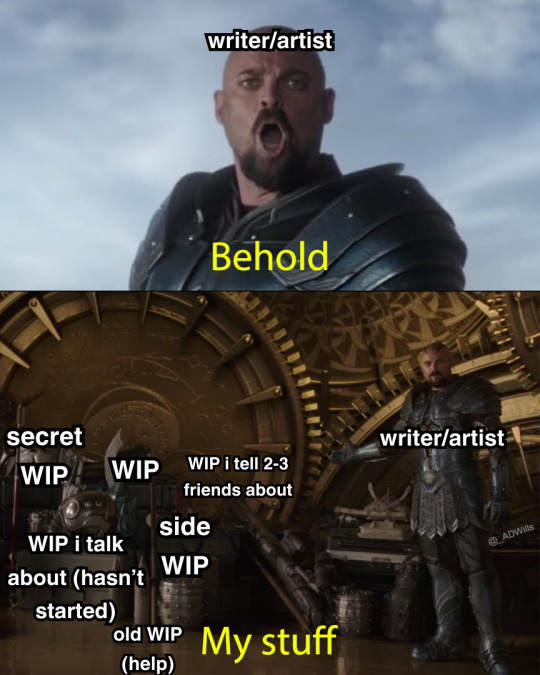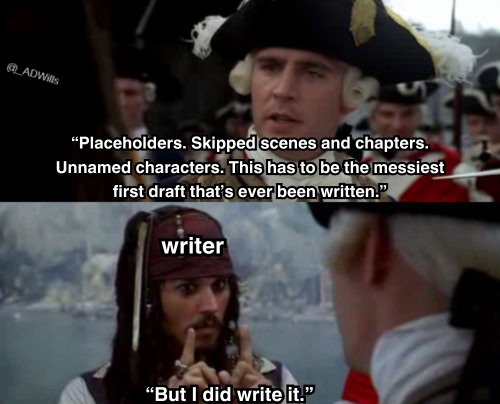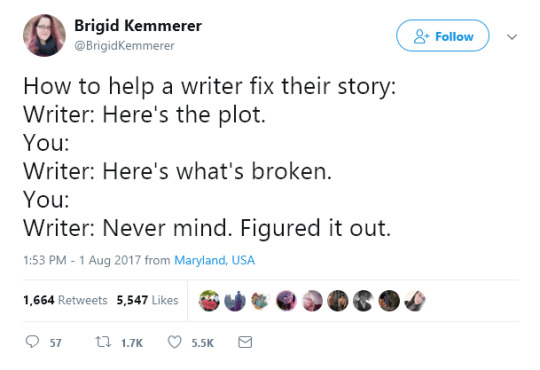Text
@nathanwpyle
I literally love this.
I couldn't stop laughing for 20 minutes.
No joke.






157K notes
·
View notes
Text
Your story matters. You matter. In times like now, we need fiction, original and fandom, written with genuine heart and sincere effort. Stories written by people who care about what they're writing will change the world, whether it's by sending a message or giving the reader a break from reality. Stories written by people who care satisfy some part of us, deep in the soul, that can't be reached any other way. And that goes for both readers and writers.
That's the power of art.
Just remember: You are an artist. And your art matters, even if no one but you ever sees it.
227 notes
·
View notes
Text
what if I don’t have enough time to write everything within me. what then. where do the words go. do they get sent to another writer. those are my words. give them back
236 notes
·
View notes
Text
Just in case anyone was confused or concerned.
Drafting is a skill. And it's a skill you can learn. If you ever look at your first draft and go 'actually this is good' do not immediately go 'no it's can't be good it's a first draft'. If you've been writing for a while (like years) writing a draft that is perfectly serviceable and only needs some editing without a ton of cutting is like... fine.
I spend a lot of my time 'writing' and 'rewriting' drafts 6-10 times in my head and when they finally come out as my 'first draft' (or a second in some cases) it's already been through 2-8 revisions. The work has been done and the words I'm writing are the culmination of those revisions. I just didn't write it down.
Not all revisions have to take place in meat space or as text on a screen. Revisions happen as you play out scenarios over and over again in day dreams or bed time stories. Your first draft is not something that Must be conquered and tamed into something presentable. Sometimes you nail it because you've spent all the revision time already.
This is not something that comes to everyone. But it is something you can get good at. You do not have to agonize over a 5th rewrite if the first time you've put words to paper is already the 6th revision that's gotten better every time. There's a lotta 'you gotta suffer to make a book good' in writeblr I just don't agree with. You can just nail it the "First Time". Not every time. But you can.
1K notes
·
View notes
Text
How To (Realistically) Make A Habit Of Writing
To clarify: Works with my autism. WORKS WITH MY AUTISM!!! I’ve been meeting my goals since I made them my New Year’s resolution! Anyway I’m so sick of all those ‘how to’ guides that don’t actually tell you what the process is they’re just like ‘just do it, but don’t burn yourself out, do what’s best for you!’ because you’re not telling me what I’m not supposed to be burning myself out over but okay, so I made my own. Hope this helps
1. Choose your fighter metric. What works better for you as a measurement of your progress; time spent writing or your word count? Personally I get very motivated and encouraged by seeing my word count go up and making a note of where it should be when I’m done, so I measure by that. At the same time, a lot of people are also very discouraged by their word count and it can negatively impact their motivation to write, and in that case you may be better off working from how much time you spend writing rather than where the word count is
2. Choose your starter Pokémon time frame. How often can you write before it starts to feel like a chore or a burden rather than something fun you look forward to? Many people believe that they have to write daily, but for some people this can do more harm than good. Maybe every two or three days? Weekly? Figure out what fits your schedule and go with it
3. Choose your funny third joke goal. Now that you’ve got your chosen time frame to complete your goal in, what’s a reasonable goal to aim to complete within that time frame based on the metric you chose? If your metric is your word count, how much can you reasonably and consistently write within your chosen time frame? If your metric is time spent writing, how much time can you reasonably and consistently spend writing within that time? Maybe 1000 words per week works, or maybe 10 minutes per day? The goal here is to find something that works for you and your own schedule without burning you out
4. Trial and error. Experiment with your new target and adapt it accordingly. Most people can’t consistently write 1667 words per day like you do in NaNoWriMo, so we want to avoid that and aim somewhere more reasonable. If you feel like it’s too much to do in such a short time frame, either give yourself less to do or more time to do it in. If you find yourself begrudgingly writing so often that it constantly feels more like a chore than something fun, maybe consider adapting things. And if you think that you gave yourself too much wiggle room and you could do more than this consistently, give yourself more of a challenge. Everything needs to suit you and your pace and needs
5. Run your own race. Don’t feel like you’re not accomplishing enough in comparison to others or not working fast enough to satisfy some arbitrary feeling of doubt. Everybody works at their own pace and slower work doesn’t mean worse work. You could be on one word per day and you’ll still see consistent results, which is still one word per day more than you could originally count on. All progress is progress, regardless of its speed
2K notes
·
View notes
Text
writers and artists will go "this isn't good enough." my brother in christ, you're creating something new out of nothing and expressing yourself creatively. your productivity and unrealistic standards of perfection do not define you or the worth of your art. you're doing great.
24K notes
·
View notes
Text
I need everyone to know that the ship Götheborg, the world's largest ocean-going wooden sailing ship, answered a distress call the other day.

Imagine waiting for the coast guard or whatever to show up and instead a replica of 18th century merchant ship pulls up and tows you to the coast.
211K notes
·
View notes
Text
Reblog so everyone can hear what they need.
11K notes
·
View notes
Text
“How’s your WIP going?”

"Have you made any progress?”

“How close are you to being done?”

45K notes
·
View notes
Text
🟢 You are still a writer even when you haven't written in a while.
🟢 You are still a writer even when you feel like you aren't writing enough.
🟢 You are still a writer when you feel like your work isn't good.
🟢 You are still a writer when other people don't like your work.
🟢 You are still a writer when you aren't published.
🟢 You are still a writer when you only have works in progress.
🟢 You are still a writer if all you write is fanfiction.
26K notes
·
View notes
Text
Poison list
While it's important to approach writing with creativity and imagination, it's crucial to prioritize responsible and ethical storytelling. That being said, if you're looking for information on poisons for the purpose of writing fiction, it's essential to handle the subject matter with care and accuracy. Here is a list of some common poisons that you can use in your stories:
Hemlock: Hemlock is a highly poisonous plant that has been used as a poison in various works of literature. It can cause paralysis and respiratory failure.
Arsenic: Arsenic is a toxic element that has been historically used as a poison. It can be lethal in high doses and can cause symptoms such as vomiting, abdominal pain, and organ failure.
Cyanide: Cyanide is a fast-acting poison that affects the body's ability to use oxygen. It can cause rapid loss of consciousness and cardiac arrest.
Nightshade: Nightshade plants, such as Belladonna or Deadly Nightshade, contain toxic compounds that can cause hallucinations, respiratory distress, blurred vision, dizziness, an increased heart rate, and even death when ingested.
Ricin: Ricin is a potent poison derived from the castor bean plant. It can cause organ failure and has been used as a plot device in various fictional works.
Strychnine: Strychnine is a highly toxic alkaloid that affects the nervous system, leading to muscle spasms, convulsions, and respiratory failure.
Snake Venom: Various snake venoms can be used in fiction as deadly poisons. Different snake species have different types of venom, each with its own effects on the body.
Digitalis: Digitalis, derived from the foxglove plant, contains cardiac glycosides. It has been historically used to treat heart conditions, but in high doses, it can be toxic. Overdosing on digitalis can cause irregular heart rhythms, nausea, vomiting, and visual disturbances.
Lead: Lead poisoning, often resulting from the ingestion or inhalation of lead-based substances, has been a concern throughout history. Lead is a heavy metal that can affect the nervous system, leading to symptoms such as abdominal pain, cognitive impairment, anemia, and developmental issues, particularly in children.
Mercury: Mercury is a toxic heavy metal that has been used in various forms throughout history. Ingesting or inhaling mercury vapors can lead to mercury poisoning, causing symptoms like neurological impairment, kidney damage, respiratory issues, and gastrointestinal problems.
Aconite: Also known as Wolfsbane or Monkshood, aconite is a highly toxic plant. Its roots and leaves contain aconitine alkaloids, which can affect the heart and nervous system. Ingesting aconite can lead to symptoms like numbness, tingling, paralysis, cardiac arrhythmias, and respiratory failure.
Thallium: Thallium is a toxic heavy metal that can cause severe poisoning. It has been used as a poison due to its tastelessness and ability to mimic other substances. Thallium poisoning can lead to symptoms like hair loss, neurological issues, gastrointestinal disturbances, and damage to the kidneys and liver.
When incorporating poisons into your writing, it is essential to research and accurately portray the effects and symptoms associated with them. Additionally, be mindful of the potential impact your writing may have on readers and the importance of providing appropriate context and warnings if necessary.
If you want to read more posts about writing, please click here and give me a follow!

19K notes
·
View notes





